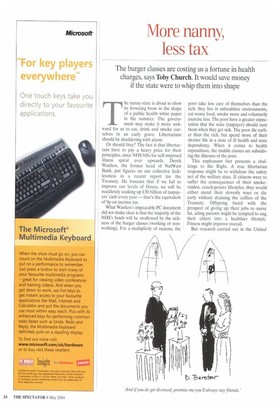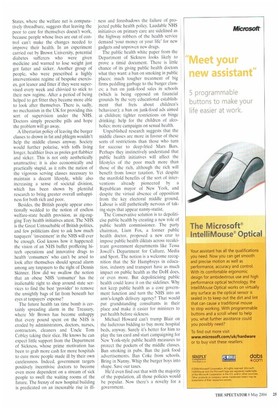More nanny, less tax
The burger classes are costing us a fortune in health charges, says Toby Church. It would save money if the state were to whip them into shape The nanny state is about to show its frowning brow in the shape of a public health white paper in the summer. The government may make it more awkward for us to eat, drink and smoke ourselves to an early grave. Libertarians should be shuddering with alarm.
Or should they? The fact is that libertarians have to pay a heavy price for their principles, since NHS bills for self-imposed illness spiral ever upwards. Derek Wanless, the former head of NatWest Bank, put figures on our collective fecklessness in a recent report for the Treasury. He forecast that if we fail to improve our levels of fitness, we will be needlessly soaking up £30 billion of taxpayers' cash every year — that's the equivalent of 9p on income tax.
What Wanless's impeccably PC document did not make clear is that the majority of the NHS's funds will be swallowed by the sickness of the burger classes (working or nonworking). For a multiplicity of reasons, the
poor take less care of themselves than the rich: they live in unhealthier environments, eat worse food, smoke more and voluntarily exercise less. The poor have a greater expectation that the state (taxpayer) should cure them when they get sick. The poor die earlier than the rich, but spend more of their shorter life in a state of ill health and state dependency. When it comes to health expenditure, the middle classes are subsidising the illnesses of the poor.
This unpleasant fact presents a challenge to the Right. A true libertarian response might be to withdraw the safety net of the welfare state. If citizens were to suffer the consequences of their smokeridden, couch-potato lifestyles, they would either mend their slovenly ways or die early without draining the coffers of the Treasury. Offspring faced with the prospect of giving up their jobs to nurse fat, ailing parents might be tempted to nag their elders into a healthier lifestyle. Fitness might improve overall.
But research carried out in the United States, where the welfare net is comparatively threadbare, suggests that leaving the poor to care for themselves doesn't work, because people whose lives are out of control can't make the changes needed to improve their health. In an experiment carried out by Brown University, potential diabetes sufferers who were given medicine and warned to lose weight just got fatter and sicker. Another group of people, who were prescribed a highly interventionist regime of bespoke exercises, got leaner and fitter if they were supervised every week and chivvied to stick to their new regime. After a period of being helped to get fitter they became more able to look after themselves. There is, sadly, no mechanism in the UK for providing this sort of supervision under the NHS. Doctors simply prescribe pills and hope the problem will go away.
A libertarian policy of leaving the burger classes to drown in fat and phlegm wouldn't help the middle classes anyway. Society would further polarise, with toffs living longer, healthier lives as proles got flabbier and sicker. This is not only aesthetically unattractive; it is also economically and practically stupid, as it robs the nation of the vigorous serving classes necessary to maintain a decent lifestyle, while also increasing a sense of societal division, which has been shown by plentiful research to bring greater overall unhappiness for both rich and poor.
Besides, the British people appear emotionally wedded to the notion of endless welfare-state health provision, as zig-zagging Tory health initiatives attest. The NHS is the Great Untouchable of British politics, and few politicians dare to ask how much taxpayers' investment' in the NHS will ever be enough. God knows how it happened: the vision of an NHS buffet proffering hitech operations and innovative drugs to health 'consumers' who can't be arsed to look after themselves should spread alarm among any taxpayers to the right of Dennis Skinner. How did we swallow the notion that an obese NHS 'consumer' has the inalienable right to shop around state services to find the best 'provider' to remove the unsightly bags of fat from beneath her eyes at taxpayers' expense?
The future health tax time bomb is certainly spreading alarm in the Treasury, where Mr Brown has become unhappy that every pound spent on the NHS is eroded by administrators, doctors, nurses, contractors, cleaners and Uncle Tom Cobley taking their slice. He knows he can expect little support from the Department of Sickness, whose prime motivation has been to grab more cash for more hospitals to cure more people made ill by their own carelessness. Indeed, government targets positively incentivise doctors to become even more dependent on a stream of sick people to swell the waiting rooms of the future. The frenzy of new hospital building is predicated on an inexorable rise in ill
ness and foreshadows the failure of projected public health policy. Laudable NHS initiatives on primary care are sidelined as the highway robbers of the health service demand 'your money or your life' for new gadgets and unproven new drugs.
The public health white paper from the Department of Sickness looks likely to prove a timid document. There is little chance of its giving public health doctors what they want: a ban on smoking in public places; much tougher treatment of big firms peddling garbage to the burger classes: a ban on junk-food sales in schools (which is being opposed on financial grounds by the very educational establish ment that frets about children's behaviour); a ban on junk-food ads aimed at children; tighter restrictions on binge drinking; help for the children of alcoholics; more campaigns on sexual health.
Unpublished research suggests that the middle classes are more in favour of these sorts of restrictions than those who turn for succour to deep-fried Mars Bars. Perhaps they instinctively understand that public health initiatives will affect the lifestyles of the poor much more than those of the rich, although the rich will benefit from lower taxation. Yet despite the manifold benefits of the sort of interventions already pioneered by a Republican mayor of New York, and despite the virtual absence of opposition from the key electoral middle ground, Labour is still pathetically nervous of taking steps that appear nanny-statist.
The Conservative solution is to depoliticise public health by creating a new role of public health commissioner. The party chairman, Liam Fox, a former public health doctor, proposed a new czar to impose public health diktats across recalcitrant government departments like Tessa Jowell's Department for Culture, Media and Sport. The notion is a welcome recognition that the Sir Humphreys in education, industry and transport have as much impact on public health as the DoH does, or even more. But depoliticising public health could leave it on the sidelines. Why not keep public health as a core government function and turn the NHS into an arm's-length delivery agency? That would put grandstanding consultants in their place and make it easier for ministers to put health before sickness.
Michael Howard can't trump Blair on the ludicrous bidding to buy more hospital beds, anyway. Surely it's better for him to play the tax card and start campaigning for New York-style public health measures to protect the pockets of the middle classes. Ban smoking in pubs. Ban the junk food advertisements. Ban Coke from schools. Bring in Nanny. Whip the burger boys into shape. Save our taxes.
He'd even find out that with the majority of the population, all those policies would be popular. Now there's a novelty for a government.













































































 Previous page
Previous page